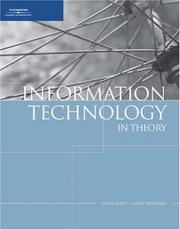| Listing 1 - 10 of 16 | << page >> |
Sort by
|
Book
ISBN: 1283258633 9786613258632 0262298228 0262297280 9780262298223 9781283258630 9780262016025 0262016028 Year: 2011 Publisher: Cambridge, Mass. The MIT Press
Abstract | Keywords | Export | Availability | Bookmark
 Loading...
Loading...Choose an application
- Reference Manager
- EndNote
- RefWorks (Direct export to RefWorks)
The economic and political stakes in the current heated debates over "openness" and open standards in the Internet's architecture.
Computer networks --- Internetworking (Telecommunication) --- Standards --- Government policy. --- Political aspects. --- Economic aspects. --- Technological innovations. --- Inter-networking (Telecommunication) --- Interoperability in computer networks --- Communication systems, Computer --- Computer communication systems --- Data networks, Computer --- ECNs (Electronic communication networks) --- Electronic communication networks --- Networks, Computer --- Teleprocessing networks --- Data transmission systems --- Digital communications --- Electronic systems --- Information networks --- Telecommunication --- Cyberinfrastructure --- Electronic data processing --- Network computers --- Distributed processing --- SOCIAL SCIENCES/Political Science/Public Policy & Law --- Science --- Standardization --- Industrial and intellectual property --- Computer architecture. Operating systems --- Technological innovations
Book
ISBN: 9780300233070 0300233078 0300249330 9780300249330 Year: 2020 Publisher: New Haven, CT : Yale University Press,
Abstract | Keywords | Export | Availability | Bookmark
 Loading...
Loading...Choose an application
- Reference Manager
- EndNote
- RefWorks (Direct export to RefWorks)
A compelling argument that the Internet of things threatens human rights and security and that suggests policy prescriptions to protect our future The Internet has leapt from human-facing display screens into the material objects all around us. In this so-called Internet of Things—connecting everything from cars to cardiac monitors to home appliances—there is no longer a meaningful distinction between physical and virtual worlds. Everything is connected. The social and economic benefits are tremendous, but there is a downside: an outage in cyberspace can result not only in a loss of communication but also potentially a loss of life. Control of this infrastructure has become a proxy for political power, since countries can easily reach across borders to disrupt real-world systems. Laura DeNardis argues that this diffusion of the Internet into the physical world radically escalates governance concerns around privacy, discrimination, human safety, democracy, and national security, and she offers new cyber-policy solutions. In her discussion, she makes visible the sinews of power already embedded in our technology and explores how hidden technical governance arrangements will become the constitution of our future.
Internet of things --- Internet governance --- Cyberinfrastructure --- Computer security --- Security measures --- Human rights --- Computer architecture. Operating systems --- Cyberinfrastructure - Security measures --- Internet. --- Internet --- Internet of things. --- Social aspects. --- Security measures.
Book
ISBN: 0300182112 9780300182118 1306168287 9781306168281 9780300181357 0300181353 9780300212525 Year: 2014 Publisher: New Haven : Yale University Press,
Abstract | Keywords | Export | Availability | Bookmark
 Loading...
Loading...Choose an application
- Reference Manager
- EndNote
- RefWorks (Direct export to RefWorks)
The Internet has transformed the manner in which information is exchanged and business is conducted, arguably more than any other communication development in the past century. Despite its wide reach and powerful global influence, it is a medium uncontrolled by any one centralized system, organization, or governing body, a reality that has given rise to all manner of free-speech issues and cybersecurity concerns. The conflicts surrounding Internet governance are the new spaces where political and economic power is unfolding in the twenty-first century. This all-important study by Laura DeNardis reveals the inner power structure already in place within the architectures and institutions of Internet governance. It provides a theoretical framework for Internet governance that takes into account the privatization of global power as well as the role of sovereign nations and international treaties. In addition, DeNardis explores what is at stake in open global controversies and stresses the responsibility of the public to actively engage in these debates, because Internet governance will ultimately determine Internet freedom.
Internet governance --- Law and legislation. --- Internet governance. --- Governance, Internet --- Internet --- Management --- Recht. --- DROIT DE L'INTERNET (BRANCHES SPÉCIALES DU DROIT) --- INTERNET + WORLD WIDE WEB (RÉSEAUX INFORMATIQUES) --- SCIENCES DE LA COMMUNICATION (SOCIOLOGIE) --- Governance. --- Regulierung. --- Internet. --- Gouvernance d'Internet --- Global Governance. --- Droit.
Book
ISBN: 0262258153 1282694421 9786612694424 0262258730 Year: 2009 Publisher: Cambridge, MA : MIT Press,
Abstract | Keywords | Export | Availability | Bookmark
 Loading...
Loading...Choose an application
- Reference Manager
- EndNote
- RefWorks (Direct export to RefWorks)
What are the global implications of the looming shortage of Internet addresses and the slow deployment of the new IPv6 protocol designed to solve this problem? This book looks at this question and much more.

ISBN: 9781423901402 1423901401 Year: 2008 Publisher: Boston (Mass.) : Thomson Course Technology,
Abstract | Keywords | Export | Availability | Bookmark
 Loading...
Loading...Choose an application
- Reference Manager
- EndNote
- RefWorks (Direct export to RefWorks)
Periodical
Abstract | Keywords | Export | Availability | Bookmark
 Loading...
Loading...Choose an application
- Reference Manager
- EndNote
- RefWorks (Direct export to RefWorks)
Periodical
Abstract | Keywords | Export | Availability | Bookmark
 Loading...
Loading...Choose an application
- Reference Manager
- EndNote
- RefWorks (Direct export to RefWorks)
Book
ISBN: 9781138889927 Year: 2018 Publisher: London New York Routledge
Abstract | Keywords | Export | Availability | Bookmark
 Loading...
Loading...Choose an application
- Reference Manager
- EndNote
- RefWorks (Direct export to RefWorks)
Book
ISBN: 9781138889934 Year: 2018 Publisher: London New York Routledge
Abstract | Keywords | Export | Availability | Bookmark
 Loading...
Loading...Choose an application
- Reference Manager
- EndNote
- RefWorks (Direct export to RefWorks)
Book
ISBN: 9781138889941 Year: 2018 Publisher: London New York Routledge
Abstract | Keywords | Export | Availability | Bookmark
 Loading...
Loading...Choose an application
- Reference Manager
- EndNote
- RefWorks (Direct export to RefWorks)
| Listing 1 - 10 of 16 | << page >> |
Sort by
|

 Search
Search Feedback
Feedback About UniCat
About UniCat  Help
Help News
News